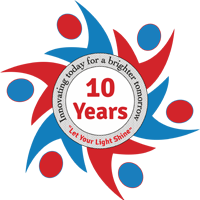Philosophy
It is important as facilitators of learning at Diyafah International School, that we recognise and understand the technological needs of the school population. This generation of children has come into a world in which technology is abundant. Their world is a world of technology which they start facing from a very young age.
The majority of children at Diyafah are very skillful at using technology, to present, communicate, create, share, edit, photograph, learn, find out, explore, research.
We encourage the use of technology as a means of supplementing and enhancing the learning and teaching experience. The children are presented with a wide range of opportunities and experiences to ensure they can successfully utilise their technological skills and knowledge in a variety of contexts.
Use of personal electronic items: Students are not permitted to bring their personal electronic items to school.
Electronic items such as iPad, smart watches and mobile phones, if brought to school by any student, will be confiscated by the teacher and parents will be called to collect them from school. Students in Year 3 – 13 are permitted to bring their devices for school use. (BYOD)
Network Access
Staff and students have access to reliable hardware and software to use ICT effectively as a teaching and learning resource. It is also used as a working tool for management and administration.
Every classroom has at least one PC and Overhead projector for staff use.
Provision for Equal Opportunitie Special Needs
We ensure free access for all when using ICT equipment.Children with learning difficulties canals obegiven greater access to the whole curriculum through the use of ICT.Their motivation can be heightened and they are able to improve the accuracy and presentation of their work.This in turn can raise self-esteem.
Internet Acceptable Use Policy
The aim of this Acceptable Use Policy is to ensure that pupils will benefit from learning opportunities offered by the school’s Internet resources in a safe and effective manner. Internet use and access is considered a school resource and privilege.
School’s Strategy
The school will use a number of strategies in order to maximise learning opportunities and reduce risks associated with the Internet. These strategies are as follows:
- Internet sessions will always be supervised by a teacher.
- Filtering software and/or equivalent systems will be used in order tominimise the risk of exposure to inappropriate material.
- The school will regularly monitor pupils’ Internet usage.
- Students and teachers will be provided with training in Internet safety
- Uploading and downloading of non-approved software will not be permitted.
- Virus protection software will be used and updated on a regular basis.
- The use of personal USB or CD in school requires a teacher’s permission. If staff or students discover an unsuitable site, it must be reported to the managed service provider or the ICT coordinator within one school day.
- Senior staff will ensure that regular checks are made to ensure that the filtering methods selected are appropriate, effective and reasonable.
Guidelines for Students:
All students are given the following guidelines to encourage safe usage of internet:
Internet Safety: Keeping Ourselves Safe
I know that almost any one I contact online is a stranger to me and that I should not share personal information with strangers no matter how nice they seem to be.
I understand that sometimes I may see a site on the Internet that has pictures or words that my teacher or parents would not want me to see.
- I will not try to find those sites
- If I come across one of them by accident, I will leave it as soon as I can
- I will quickly use my forward or backwards keys to take me to another site
- I will report it to my teacher/an adult working in the school
- I know that my teachers and the Principal want me to use the Internet to learn about the projects I am working on in class.
- I will not use the Internet for any other reason.
- I will not access the internet without an adult being present.
- I may be given a password – a special word that only I know. I may have to use this password to sign onto a computer or to send mail over the Internet.
I know
- only I should know my password
- never to tell a friend my password
- I should never use someone else’s password
